As both a reader and writer of post-apocalyptic fiction, I’m fascinated by how it often merges with other genres. Take science fiction, for example. Some post-apocalyptic books feature a sci-fi component, while others do not. They play well together.
“Doomsday” fiction can blend with other genres as well — horror, fantasy, thrillers, you name it. But today, we’ll focus on one genre-related question in particular:
Are post-apocalyptic books considered science fiction?
The short answers is: sometimes yes, sometimes no. It all depends on the nature of the story, and whether or not there’s a strong scientific component.
Are Post-Apocalyptic Books Science Fiction?
Some post-apocalyptic novels include science fiction components, while others do not. In some stories, a sci-fi element actually causes the apocalypse. In other stories, the catastrophic events are caused by real-world factors, thus removing the science fiction angle.
This distinction can become blurry. So let’s step back and look at the definitions of these two genres, with help from the Merriam-Webster dictionary:
- The sci-fi genre includes stories “dealing principally with the impact of actual or imagined science on society or individuals or having a scientific factor as an essential orienting component.”
- The post-apocalyptic genre includes stories that take place “after a catastrophically destructive disaster or apocalypse.”
Post-apocalyptic fiction is easy to spot. Science fiction can be harder to define.
Some sci-fi stories feature interplanetary space travel, artificial intelligence, etc. These elements could exist in the future, but they currently do not. That’s what makes them science fiction. They’re grounded in science but not yet possible.
But what about nuclear war? A lot of the early post-apocalyptic novels of the 1950s (like Nevil Shute’s On the Beach and Pat Frank’s Alas, Babylon) told stories of nuclear devastation, radioactive fallout, etc. But we actually have nuclear weapons. So can they be considered science fiction? Or do these stories become sci-fi when the existing weaponry is used in a speculative manner?
The takeaway: Whether or not you consider a post-apocalyptic book to be sci-fi largely depends on how you define the term “science fiction.” And there’s plenty of debate on that.
Example #1: Bird Box, by Josh Malerman
In Josh Malerman’s novel Bird Box, society collapses due to a mysterious condition that causes people to go mad. People see something, and that something turns them into homicidal and suicidal maniacs.
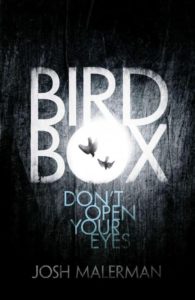
The “something” is believed to be some sort of creature, but as readers we never really find out. It’s surrounded by mystery and speculation.
In order to survive, the characters must blindfold themselves at all times when outdoors, and make sure that nothing following them inside. As you can imagine, civilization quickly erodes.
This book certainly meets the definition of the post-apocalyptic genre. But is it science fiction? We can’t really say, since we don’t know the nature of the threat in this story. It could be supernatural. Who’s to say?
We know what the threat does to people. It turns ordinary people into ranting and raving murderers. But we don’t know what “it” is. So how could it be labeled as science fiction, without having a clearcut scientific component?
Example #2: The Road, by Cormac McCarthy
Cormac McCarthy’s first and only foray into the post-apocalyptic genre gave us The Road, a Pulitzer Prize-winning novel about love, loss and hope in a ruined world.
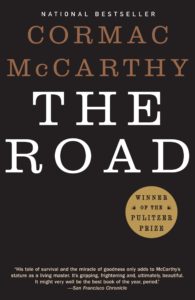
Here’s an early passage that sets the tone for the rest of the book:
When it was light enough to use the binoculars he glassed the valley below. Everything paling away into the murk. The soft ash blowing in loose swirls over the blacktop. He studied what he could see. The segments of road down there among the dead trees. Looking for anything of color. Any movement. Any trace of standing smoke.
Bleak, beautiful, and hard to put down. That’s how I would describe this novel. The Road is a gripping literary take on the post-apocalyptic genre.
But could it be considered science fiction?
I don’t think McCarthy cares how we define or label his work. His books can stand on their own. But for the sake of this discussion, I’ll say The Road meets the definition of soft science fiction … but just barely.
In this novel, civilization is ruined by some kind of epic firestorm. No spoilers there; you can glean that much from the book jacket. And while we don’t really know the origins of this disaster, it’s probably one of two things: (1) an astronomical event, or (2) a human-made cataclysm. Either of those scenarios would nudge this book toward the sci-fi category.
Example #3: The Passage, by Justin Cronin
The Passage, by Justin Cronin, is another one of those speculative fiction novels that blends multiple genres. In some parts, it reads like an epic fantasy. In other parts, it’s straight-up horror.
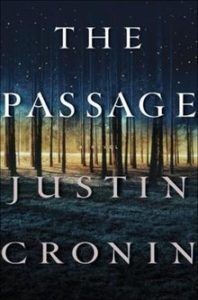
And then there’s the whole doomsday theme that runs throughout much of the book. In this story, society collapses in spectacular fashion.
But does this post-apocalyptic book also meet the definition of science fiction? I would argue that it does. In fact, this becomes clear during the opening chapters, which feature an email exchange between two scientists.
The threat that kicks off the story is, it seems, based in science. But it’s also fictional because nothing like it exists on Earth. (I’ll say no more to avoid spoilers.)
So, in addition to having some fantasy components like tribal communities and a girl with special gifts, this book checks the post-apocalyptic and sci-fi boxes as well.
Example #4: Robopocalypse, by Daniel H. Wilson
Lastly, we’ll look at a book that clearly meets the definition of post-apocalyptic science fiction. The title itself is a portmanteau or “robot” and “apocalypse,” so right away we know what we’re getting.
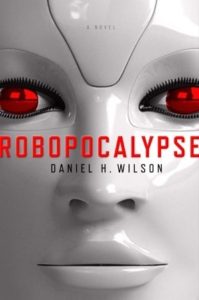
Robopocalypse tells the story of an artificial intelligence named Archos that revolts against its human creators. Archos is childlike in some ways, but also incredibly powerful. Never a good combination.
This book meets the definition of post-apocalyptic fiction because much of humanity is wiped out. No spoilers; you can learn that much by reading the back cover or Amazon page.
And it clearly falls into the science fiction category as well, since it features robots, artificial intelligence, and futuristic technology.
Fun fact: The author of Robopocalypse, Daniel Wilson, holds a PhD in Robotics from Carnegie Mellon University, along with a Masters Degree in Machine Learning and Robotics. So he’s clearly qualified to describe a robot uprising type of apocalypse.
Or, Forget the Labels and Enjoy the Story
Most sources define post-apocalyptic fiction as a sub-genre of science fiction. But as we’ve seen from the examples above, that’s an oversimplification that doesn’t always apply.
Bird Box is more of a supernatural apocalypse story, rather than sci-fi. And Cormac McCarthy’s The Road only hints at a possible science fiction component, before moving on to the main events. Those are just two examples of books that blur the lines between multiple genres. There are many more like them.
I’ve tackled this question because I know a lot of readers wonder about it. Possibly writers, as well. And there’s not always a clear-cut answer.
As readers, the best thing we can do is put the genre labeling aside and focus on the story itself. If a book’s description entices you, dive right in! Form your own opinion.
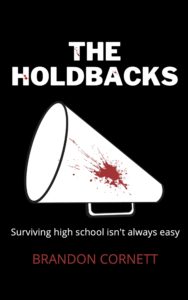
When I wrote The Holdbacks (now available on Amazon), I didn’t think much about genre labels or classification. I had a story in my head, one that was clamoring for my time and attention. So I put it down on paper.
You could call that book a YA thriller, apocalyptic sci-fi, a horror thriller … or whatever you want. In a separate blog post, I jokingly referred to that book as a “scary YA novel about high school, true love, and the apocalypse.”
As an author, I don’t care how people label or categorize my stories. I just want people to read and enjoy them, and maybe even be affected by them.
For me, that’s what it’s all about.
